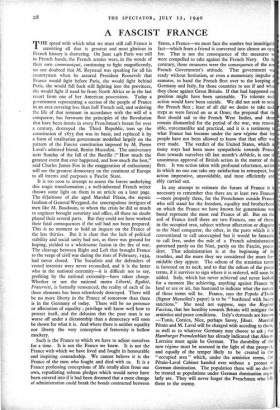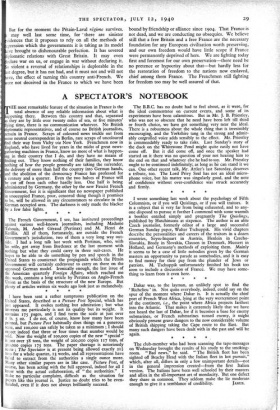A FASCIST FRANCE
THE speed with which what we must still call France is unwriting all that is greatest and most glorious in French history is shattering. On June 14th Paris was still in French hands, the French armies were, in the words of their own communiqué, continuing to fight magnificently, no one doubted that M. Reynaud was speaking for all his countrymen when he assured President Roosevelt that France would fight before Paris, she would fight behind Paris, she would fall back still fighting into the provinces, she would fight if need be from North Africa or in the last resort from one of her American possessions. Today a government representing a section of the people of France in an area covering less than half French soil, and ordering the life of that remnant in accordance with the will of a conqueror, has forsworn the principles of the Revolution that have been innate in every Frenchman's breast for over a century, destroyed the Third Republic, torn up the constitution of 1875 that was its basis, and replaced it by a form of totalitarian government modelled largely on the pattern of the Fascist constitution imposed by M. Pierre Laval's admired friend, Benito Mussolini. The anniversary next Sunday of the fall of the Bastille (" How much the greatest event that ever happened, and how much the best," said Charles James Fox in the exaggeration of enthusiasm) will see the greatest democracy on the continent of Europe to all intents and purposes a Fascist State.
It is too soon to attempt to assess the forces underlying this tragic transformation ; a well-informed French writer throws some light on them in an article on a later page. The defaitisme of the aged Marshal Petain, the mystic fatalism of General Weygand, the unscrupulous intrigues of men like M. Baudouin, to whom the crisis he did so much to engineer brought notoriety and office, all these no doubt played their several parts. But they could not have worked their fatal consequences if the soil had not been prepared. This is no moment to hold an inquest on the France of the late thirties. But it is clear that the lack of political stability and social unity had not, as there was ground for hoping, yielded to a wholesome fusion in the fire of war. The cleavage between Right and Left that brought France to the verge of civil war during the riots of February, 1934, had never closed. The Socialists and the defenders of vested interests were never reconciled, and it is the latter who in the national extremity—it is difficult not to say, profiting by the national extremity—have taken charge. Whether or not the national motto Liberte, Egalite, Fraternite, is formally renounced, the reality of each of its three elements has been relentlessly destroyed. There will be no more liberty in the France of tomorrow than there is in the Germany of today. There will be no pretence or affectation of equality ; privilege will know well how to protect itself, and the delusion that the poor man is no worse off under a dictatorship than a democracy will soon be shown for what it is. And where there is neither equality nor liberty the very conception of fraternity is hollow mockery.
Such is the France to which we have to adjust ourselves for a time. It is not the France we knew. It is not the France with which we have lived and fought in honourable and inspiring comradeship. We cannot believe it is the France of the men who fought and died with us. It is a France professing conceptions of life totally alien from our own, repudiating solemn pledges which would never have been entered into if it had been dreamed that a mere change of administration could break the bonds contracted between States, a France—we must face the sombre but immitigab fact—which from a friend is converted into almost an op foe. That is not the consequence of the measures w were compelled to take against the French Navy. On t contrary, those measures were the consequence of the ne French Government's attitude. That government w ready without hesitation, or even a momentary impulse remorse, to hand the French fleet over to the keeping Germany and Italy, for those countries to use if and whe they chose against Great Britain. If that had happened o position might have been untenable. To tolerate suc action would have been suicide. We did not seek to seiz the French fleet ; least of all did we desire to take suc steps as were forced on us at Oran; the proposal that t fleet should sail to the French West Indies, and ther remain dismantled for the period of the war, was reason able, statesmanlike and practical, and it is a testimony t what France has become under the new regime that h people have not been allowed to know that that offer w ever made. The verdict of the United States, which many ways had been more sympathetic towards Franc than towards ourselves till last month's debacle, is one unanimous approval of British action in the matter of the fleet. It was action taken with profound reluctance, action in which no one can take any satisfaction in retrospect, but action imperative, unavoidable, and most efficiently and ably carried out.
In any attempt to estimate the future of France it is necessary to remember that there are at least two Frances —more properly three, for the Frenchmen outside France who still stand for the freedom, equality and brotherhood on which the France we have known for generations was based represent the most real France of all. But on the soil of France itself there are two Frances, one of them, in the occupied area, subject without affectation or disguise to the Nazi conqueror, the other, in the parts which it is conventional to call unoccupied but it would be fantastic to call free, under the rule of a French administration patterned partly on the Nazi, partly on the Fascist, prece- dent. That administration is at the beginning of its troubles, and the more they are considered the more for- midable they appear. The odium of the armistice terms is fastened on its neck, and to that the odium of the peace terms, if it survives to sign where it is ordered, will soon be added. Italy, which has never achieved and never looked for a moment like achieving, anything against France by land or sea or air, has hastened to indicate what the nature of those terms will be. France, says the Popolo d'Italia (Signor Mussolini's paper) is to be " burdened with heavy sanctions." She need not suppose, says the Regime Fascista, that her hostility towards Britain will mitigate the armistice and peace conditions. Italy's demands are known —Tunis, Corsica, Nice, perhaps Savoy, Jibuti. Marshal Petain and M. Laval will be charged with acceding to them, as well as to whatever Germany may choose to ask ; the Hamburger Fremdenblatt has already indicated that Alsace- Lorraine must again be German. The durability of the new regime must be assessed in the light of that prospect, and equally of the temper likely to be created in the " occupied area " which, under the armistice terms, the Petain-Laval Cabinet handed over without a protest to German domination. The population there will no doubt be treated as populations under German domination regu- larly are. They will never forget the Frenchmen who left them to the enemy. But for the moment the Petain-Laval regime survives.
may well last some time, for ' there are sinister ‘idences that it proposes to rely on all the methods of epression which the governments it is taking as its model ave brought to dishonourable perfection. It has severed plomatic relations with Great Britain. It may even eclare war on us, or engage in war without declaring it.
violent a reversal of relationships is deplorable in the st degree, but it has not had, and it must not and will not aye, the effect of turning this country anti-French. We ere not deceived in the France to which we have been bound by friendship or affiance since 1904. That France is not dead, and we are conducting no obsequies. We believe still that a free Britain and a free France are the necessary foundation for any European civilisation worth preserving, and our own freedom would have little scope if France were permanently deprived of hers. We are fighting today first and foremost for our own preservation—there need be no pretence or hypocrisy about that—but hardly less for the restoration of freedom to the nations now enslaved, chief among them France. The Frenchmen still fighting for freedom too may be well assured of that.



























 Previous page
Previous page